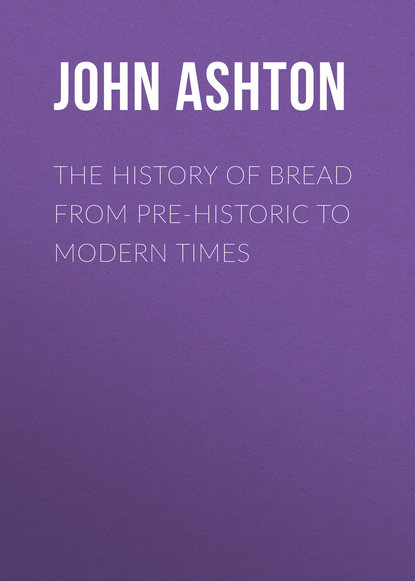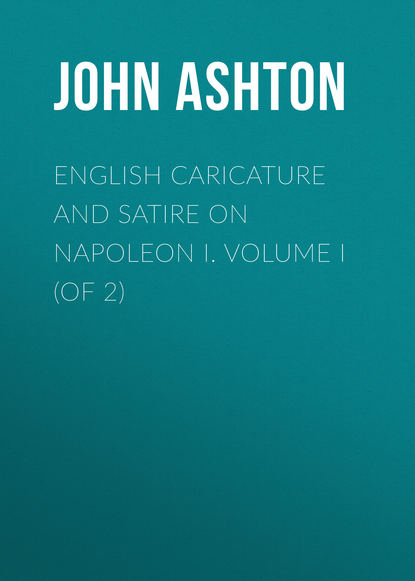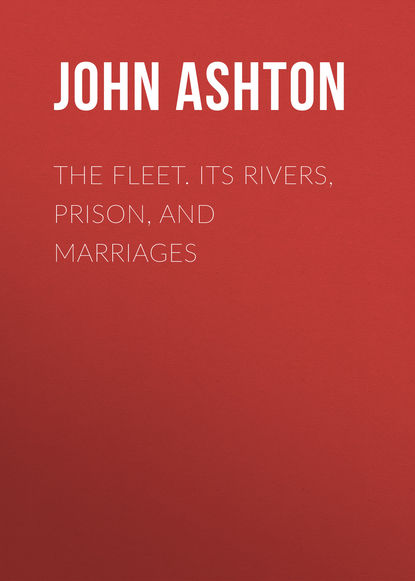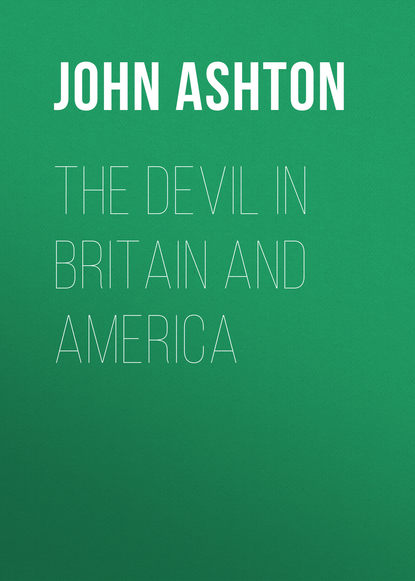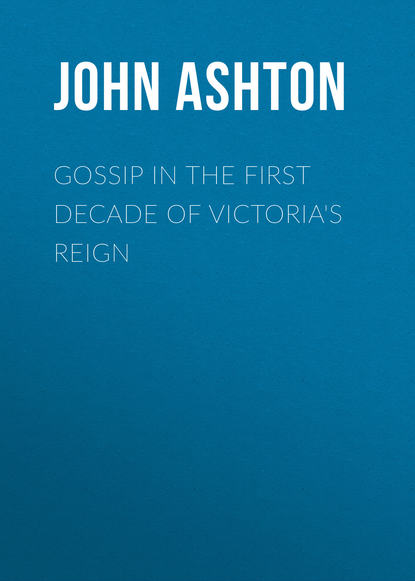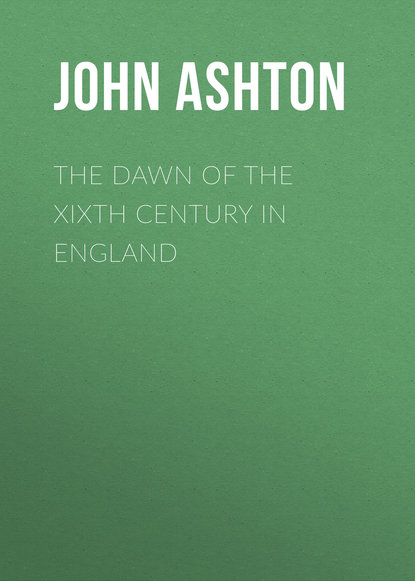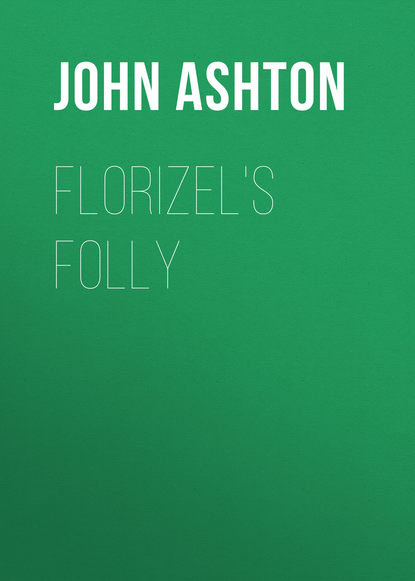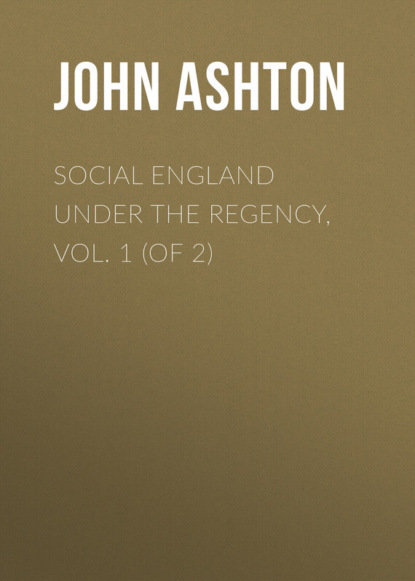
Полная версия
Social England under the Regency, Vol. 1 (of 2)
"And that they were directed to express the hope which the Lords spiritual and temporal, and Commons entertain, that his Royal Highness, from his regard to the interests of his Majesty, will be ready to undertake the weighty and important trust proposed to be invested in his Royal Highness, as soon as an Act of Parliament shall have been passed for carrying the said resolutions into effect."
The Lord President first read and then delivered to the Prince the Resolutions, and he replied: —
"I receive the communication which the two Houses have directed you to make to me of their joint Resolutions, on the subject of providing for 'the exercise of the Royal Authority during his Majesty's illness,' with those sentiments of regard which I must ever entertain for the united desires of the two Houses.
"With the same sentiments I receive the expressed hopes of the Lords and Commons, that from my regard for the interest of his Majesty and the Nation, I should be ready to undertake the weighty and important trust proposed to be invested in me, under the Restrictions and Limitations stated in those Resolutions.
"Conscious that every feeling of my heart would have prompted me, from dutiful affection to my beloved Father and Sovereign, to have shown all the reverential delicacy towards him inculcated in those Resolutions, I cannot refrain from expressing my regret, that I should not have been allowed the opportunity of manifesting to his afflicted and loyal subjects that such would have been my conduct.
"Deeply impressed, however, with the necessity of tranquilizing the public mind, and determined to submit to every personal sacrifice, consistent with the regard I owe to the security of my Father's Crown, and the equal regard I owe to the welfare of his people, I do not hesitate to accept the office and situation proposed to me, restricted as they are, still retaining every opinion expressed by me upon a former and similar distressing occasion.
"In undertaking the trust proposed to me I am well aware of the difficulties of the situation in which I shall be placed; but I shall rely with confidence upon the Constitutional advice of an enlightened Parliament, and the zealous support of a generous and loyal people. I will use all the means left to me to merit both.
"You will communicate this my answer to the two Houses, accompanied by my most fervent wishes and prayers, that the Divine Will may extricate us, and the nation, from the grievous embarrassments of our present Condition, by the speedy restoration of his Majesty's health."
The Queen gave an answer, couched in a similar spirit to the deputation which waited upon her.
Whilst the Lords and Commons are debating on the Regency Bill (and they took the whole of January to do it), let us see what was happening in England.
There was a subject that touched many, and all over Britain, from the highest to the lowest, and that was the British Prisoners of War in France. Truly we had many more French prisoners in England than there were English in France; The Morning Post, October 15, 1810, placing the numbers respectively at 50,000 and 12,000. The French prisoners here, were not treated too well; but the English prisoners in France, were treated worse, and many thousands of hearts must have yearned towards those poor Captives, and many thousands were willing to part with their means, although there were then many, and urgent, calls upon their purses, in order to alleviate their lot.
Lloyd's was then the Centre of benevolence, as the Mansion House now is; and the leading Merchants and Bankers issued an advertisement in The Times of January 7th, saying that their means of helping these prisoners were exhausted, and they appealed for fresh funds.
"The Committee beg to state that there are upwards of 10,000 British Prisoners in the different Prisons in France, for the most part in great distress, and that the subscription is intended for the alleviation of their sufferings in some degree, by assisting them with articles of clothing, bedding, fuel, and such other necessaries as they stand in most need of.
"They think it proper to add that the relief from the last subscription, was intrusted to the care of some of the most respectable persons detained in France, among whom were Clergymen, and several officers both Naval and Military, and that they have made so satisfactory a distribution of the funds, and rendered such particular details thereof, as to entitle them to the highest credit. The same Gentlemen, there is reason to expect, will kindly undertake the distribution of a new subscription."
Needless to say that the appeal was nobly responded to.
Scant courtesy seems to have been paid to the prisoners on either side, almost degenerating into pettiness: for, this month, an Order was issued from Whitehall, that no French women should be allowed to land in this country, who might have left France to see their husbands. The reason assigned for this very peculiar proceeding, was, that the French Government would not permit Lady Lavie and family, to join her husband, Sir Thomas, who was a prisoner at Verdun.
But pettiness in official circles seems to have obtained. Can we barely imagine, at a time when every soldier was wanted, and it might be thought that good treatment, at all events, might have allured men to the ranks, that they trod upon their tenderest feelings? Yet so it was, and it was mainly owing to the exertions of The Dublin Evening Post that the following "General Order" was issued: —
"Adjutant General's Office, Dublin,"January, 1811."Reports having been circulated, that Catholic soldiers have been prevented from attending Divine worship, according to the tenets of their religion, and obliged, in certain instances to be present at that of the Established Church, the Commanding Officers of the several Regiments, are to be attentive to the prevention of such practices, if they have, in any instance, existed in the Troops under their command, as they are in violation of the Orders contained in the Circular letter of the 14 May, 1806, and, since, repeated to the Army. And the Catholic soldiers, as well as those of other Sects, are to be allowed, in all cases, to attend the Divine Worship of the Almighty according to their several persuasions, when duty does not interfere, in the same manner, and under the same regulations, as those of the Established Church.
"Wm. Raymond, Dep. Adjt. Gen."N. Ramsey, Maj. Assist. Adjt. Gen."The Morning Chronicle commenting upon this, says: "So late as Friday morning last, some of the artillery, privates and drivers, quartered in Enniskillen, continued to do duty with turned coats, the most mortifying punishment ever inflicted on a brave man, and this, merely for having attended, according to law, to the Worship of their Church: but on the evening of that day, the scene was somewhat changed, the General Order arrived, and on the following morning, the officer accused of the oppression, departed for Dublin, and, on Sunday, the Catholic soldiers of the garrison were marched to the Roman Catholic Chapel, accompanied by the officers of that religion."
It would seem that all parties were trying to make the Services unpopular: the navy, especially, by impressment – and even the Militia did not escape – for in January, a number of farmers and others were summoned before the magistrates at Stafford for making deductions from the wages of those servants who were enrolled in the Militia and who had been absent for their training. It must be remembered that in those days farm labourers were hired at Statute fairs, for a twelvemonth, and the 15th clause of 48 Geo. III. cap. 3, had to be shown to those summoned, whereby they learned that no ballot, enrolment, or service under the Act should make void or in any manner affect, any indenture of apprenticeship, or contract of service. And so they had to pay their men.
They were rather a rough lot in the Country, and this anecdote is thus recorded in The Times of January 31, 1811: – "The following ludicrous3 circumstance occurred on Tuesday week at Bristol: – A couple of Jews being apprehended in the act of stealing several articles from the stables of the White Hart Inn, were hauled into the yard by two stout fellows, whither the whole fraternity of the currycomb were immediately summoned. The long beards of these disciples were then stuck together with pitch (their hands being previously tied behind them); and, whilst thus face to face, a profusion of snuff mixed with hellebore, was administered, which caused them to sneeze in such a manner, that by the frequent and violent bobbing of noses one against the other, a copious stream of blood issued from either nostril, whilst the enraged Culprits were kicking and capering about in all directions."
Chronologically, we must now turn to the Prince of Wales, who, one would imagine, was desirous of emulating the Squires of old, who spent the eve of their knighthood in vigil, prayer, fasting, and watching their armour – so before he became Prince Regent, he must needs partake of the Holy Eucharist, and did so at the Chapel Royal St. James' on Sunday the 27th of January, the sole object of which was to obtain a certificate that he was in the Communion of the Church of England. This public act of worship was a stately affair. The Prince was in the Royal Closet during the major portion of the service, the Bishop of London and sub-dean duly bowing to the royal presence, at their entrance. Afterwards, attended by the Earl of Moira, and Lords Dundas and Keith, he went up to the Altar, took his seat under a canopy, made his offering in a gold dish, and then the Dean, Prince, and the three Lords Communicated.
On the 5th of February the Lords and Commons had their final conference over the Regency Bill, they agreed to the interpolation of two words "and Commons," and the thing was all but finished. It only wanted what was done immediately afterwards, the Royal Commissioners to give the Royal Assent, the Deputy Clerk of the Crown to read the title of the Act, the Clerk Assistant of the Parliaments to utter the words "Le Roi le veult" – and the Prince of Wales was de facto Regent.
Knowing his proclivities, it was imagined that he would give places to all his entourage, and, accordingly, we have the caricature of "Robeing the Prince, or the Road to Preferment." To the extreme left is Earl Grey, who says "A bason of Grey pease soup is better than porter for your Highness," but Whitbread is of opinion that "If his Highness should want any refreshment, here's a pot of my best brewing." Grenville offers his services to the Prince. Sheridan hopes "your Royal Highness will not forget Old Sherry; pray allow me to brush the Royal shoes, they seem quite mouldy with lieing by so long." Colonel Bloomfield is tying his garter. Whoever is holding the looking-glass exclaims, "What an honour this is! but I hope for greater." The Regent tells Sheridan, "Fear not, my friend, all in good time." Col. McMahon says, "Why! can't you see you have given him the wrong sleeve; do give it to me, you'll make a fine figure of him!" But the person holding the robe replies, "Don't push so, Col., you won't let any one come near his Highness but yourself." Mr. Adam, the Prince's Chancellor, soliloquises thus, "A dam good prospect now, however." Sir John Douglas calls out, "Who wants me?" and Col. Geo. Hanger, hopes "you won't forget poor Georgy."
Perhaps the three best known of these Companions of the Prince are Sheridan, Col. McMahon, and George Hanger. The first belongs to history, and the second will be noticed by and by. Col. Hanger came of a noble Irish family, but in his youth led a wild harum scarum life. Of course he entered the army, and whilst holding the King's Commission he fell in with, and joined a gang of gipsies, when he fell in love with a dusky beauty, and married her according to the customs of her tribe, which, probably, only involved the jumping over a broomstick. He introduced her to his brother officers, and all went well for about a fortnight, when she eloped with a bandy-legged tinker. His tastes were congenial to those of the Prince, and he made himself useful, bought horses for him, looked after his racing arrangements, and was one of his equerries, which post he kept until he was, by his extravagance, compelled to resign it. He was more than once imprisoned for debt, but turned steady after the death of his brother Lord Coleraine (called blue Hanger, from the colour of his garments) in 1814, when he succeeded to the title, which became extinct on his death in 1824.
Meanwhile, all was being prepared for the assumption of the Regency, Carlton House was being brushed up, chandeliers cleaned, &c., a congenial task for its occupier, the Hanoverian creams were publicly exercised, and made to pass between files of soldiers, and, at last, the 6th of February, the day appointed for the Prince to take the oaths, arrived. The following is probably an official communiqué, as it appears in all the Newspapers of the period: —
"The 6th of February being the day appointed for swearing in the Prince of Wales as Regent, before his taking upon himself that important office, about twelve o'clock a party of the flank companies of the grenadiers, with their Colours, the band of the first regiment, drums and fifes, with white gaiters on, marched into the courtyard of Carlton House, where the colours were pitched in the centre of the grand entrance; the band struck up 'God save the King,' and continued playing that national piece alternately with martial airs during the day, until near five o'clock. Colonel Bloomfield, one of the Prince's principal attendants, having written to the Earl of Macclesfield, the Captain of his Majesty's yeomen of the guard, informing him it was his Royal Highness' command that as many yeoman of the guard should attend at Carlton House, as usually attended upon councils being held by the King in state, the noble Earl not being in London, the letter was opened by the person in waiting, who ordered six yeomen and an usher to attend at Carlton House, which they accordingly did; and they, together with the Prince's servants in state, lined the grand hall and staircase: several of the lifeguards men were also in some of the rooms, in a similar manner as on Court-days at St. James' Palace. About a quarter before two o'clock, the Duke of Montrose arrived, being the first of the privy councillors who attended; he was followed by all the royal dukes, and a very numerous assembly of privy councillors, who had all arrived by a quarter before three o'clock. The whole of the magnificent suite of state apartments were opened, and the illustrious persons were ushered into the Gold Room (so called from the style of the ornaments). Almost every privy councillor then in town was present – exceeding above a hundred in number.
"About half-past two o'clock, Earl Moira, of his Royal Highness' council, being also a privy councillor to the King, brought a message from the Prince to the President of the Council, Earl Camden, desiring his attendance on the Prince in an adjoining room, according to the usual form, to communicate to him officially the return to the summons, &c. The noble Earl accordingly went with Earl Moira, made the necessary intimation to his Royal Highness, and returned to the company; who, during this time of waiting were highly gratified with seeing the Princess Charlotte on horse-back, accompanied by two grooms, make the tour of the beautiful gardens in the rear of the palace. Her Royal Highness appeared to be in excellent health and spirits.
"After Earl Camden's return, the Prince approached in grand procession, preceded by the officers of his own household, and several of his own council, among whom were Earl Moira, Lords Keith, Cassilis, Hutchinson, Mr. Sheridan, Mr. M. Angelo Taylor, Mr. Tyrwhitt, Colonel McMahon, Colonel Bloomfield, General Hulse, Mr. Bicknell, &c., &c. (His Chancellor, Mr. Adam, was, by accident not present, and there was a delay, in consequence of his Royal Highness' anxious desire of his presence.) The Prince was also accompanied by all the Royal Dukes. They passed through the room where the privy councillors were assembled, through the Circular drawing room, into the grand saloon (a beautiful room in scarlet drapery, embellished with portraits of all the most distinguished Admirals who have fought the battles that have given us the dominion of the seas); and here the Prince seated himself at the top of the table, his Royal brothers and cousin seating themselves on each hand, according to seniority, and all the officers of his household, not privy councillors, ranging themselves on each side of the entrance to the Saloon. The privy councillors then proceeded, all in full dress, according to their rank – the Archbishop of Canterbury, the Lord Chancellor, the Archbishop of York, the Lord President, the Lord Privy Seal, &c., &c., &c., and, as they severally entered, they made their reverence to the Prince, who made a graceful return to each, and they successively took their places at the table; and lastly, Mr. Fawkener and Sir Stephen Cottrell took their seats as Clerk, and Keeper, of the Records.
"The Prince then spoke to the following effect: —
"'I understand that by the Act passed by the Parliament, appointing me Regent of the United Kingdom, in the name, and on behalf of his Majesty, I am required to take certain oaths, and to make a declaration before your lordships, as prescribed by the said Act. I am now ready to take these oaths, and to make the declaration prescribed.'
"The Lord Privy Seal then rose, made his reverence, approached the Regent, and read from a Parchment the oaths as follows. The Prince with an audible voice pronounced after him: —
"'I do sincerely promise and swear that I will be faithful, and bear true allegiance to his Majesty King George.
"'So help me, God.'"'I do solemnly promise and swear, that I will truly and faithfully execute the office of Regent of the United Kingdom of Great Britain and Ireland, according to an Act of Parliament passed in the fifty-first year of the reign of his Majesty King George the Third (entitled "An Act" &c.), and that I will administer, according to law, the power and authority vested in me by virtue of the said Act; and that I will in all things, to the utmost of my power and ability, consult and maintain the safety, honour, and dignity of his Majesty, and the welfare of his people.
"'So help me God!'"And the Prince subscribed the two oaths. The Lord President then presented to his Royal Highness, the declaration mentioned in an Act made in the 30th year of King Charles II., entitled, 'An Act for the more effectual preserving the King's person, and government, by disabling Papists from sitting in either House of Parliament,' and which declaration his Royal Highness audibly made, repeated, and subscribed. The Lord President signed first, and every one of the Privy Councillors in succession signed these instruments as witnesses, and the same was delivered into the hand of the Keeper of the Records.
"The Prince then delivered to the President of the Council a Certificate of his having received the Sacrament of the Lord's Supper at the Chapel Royal of St. James, on Sunday the 27th of January, which was also countersigned, and delivered to the Keeper of the Records, who deposited all these instruments in a box at the bottom of the table.
"The Lord President then approached the Regent, bent the knee, and had the honour to kiss his hand. The Royal Dukes followed, and afterwards, the Archbishop of Canterbury, and all the rest, according to the order in which they sat at the long table, advancing to the chair on both sides. During the whole of this ceremony, his Royal Highness maintained the most graceful and dignified deportment; and it was remarked, that there was not the slightest indication of partiality of behaviour to one set of men more than to another.
"The Ceremony being closed, a short levée took place in the drawing room, where his Royal Highness addressed himself to the circle; and, afterwards, he gave an audience to Mr. Perceval, who had the honour of again kissing his hand as First Lord of the Treasury and Chancellor of the Exchequer."
The Regent did wisely in not changing his Ministry, and Perceval turned dutifully towards the rising sun. It was said that in a visit he and the Chancellor (Lord Eldon) paid the King on Jan. 26th, that he turned his back on the King, a monstrous piece of rudeness in Court etiquette. Probably the poor old blind, half-demented Monarch never observed it; but others did, and there were several epigrams thereon, the following being the best —
"The people have heard, with delight and surprize,That his Minister's conduct has op'd the K – 's eyes;That with just indignation his Royal breast burn'd,When he thought he saw Per – l's back on him turn'd;Exclaiming, 'Thank G – d! I've recover'd my sight,For I now see you, Sir, in your own proper light.'"The Queen had the Custody of the King's person, but had to account to a Council consisting of the Archbishops of Canterbury and York and several Noblemen of high rank, and her first Council under the Regency was held on Feb. 13th.
About this time there was an improvement in the King's health; so much so that on the 8th of February the Queen and the Princess Augusta were allowed to have an interview with him, and on the next day and for two or three others, he appeared on the Terrace and walked for a time accompanied by the Physicians in attendance upon him.
CHAPTER III
Story of a crime – The Shanavests and the Caravats – Gluttony – Smuggling bullion – A Tar at the theatre – Deposition of French Colours in Whitehall Chapel – The Duke of York reinstated as Commander-in-Chief – The Regency Fête – Account of the entertainmentAnd now, for a while, we will leave Royalty alone, and note anything particular that occurred – not that there ever was much general news recorded – there were no country correspondents to the London Newspapers, which were but of small size, and with very little space to spare for what we call News. As these little scraps of information will be scattered throughout this book, I may at once say that they will, perforce, have no sequence one to another except that of Chronological order.
At the beginning of February, as a dragoon was returning from duty to his quarters, which were at a small public-house called "Barndean Hut," near Petersfield, in the New Forest, his attention was arrested by the cries of some person in distress, which induced him to ride up to the spot from whence they proceeded, where his humanity was shocked on beholding a woman tied to a tree, with the tears, which her situation and suffering had produced, actually frozen to her cheeks, and, horrid to relate, quite naked, having been stripped and robbed of every article of dress, by two villains, who, afterwards, left her in that deplorable condition. The dragoon instantly cut the cords that bound her hands and feet to the tree, and, having in some measure restored her to the use of her limbs by rubbing them, wrapped her up in his cloak, placed her on his horse, and proceeded on to his quarters, where he soon after arrived; and, as he was conducting the shivering object of his care into the house, she looked through a window that commanded a view of the kitchen, and, in a faint voice, exclaimed, "There are the two men that robbed me of my all, and used me so cruelly." The soldier, in consequence, entered the kitchen and secured the men, who were the next day taken before a magistrate, and, after the necessary examination, fully committed to Winchester jail, for trial at the next assizes.
Ireland has always been a sweet boon to England ever since the Union; and faction fights used to abound. Among others were those of the Caravats and Shanavests – the Capulets and Montagues of their time; and the etymon of the names of two formidable factions, which embraced the greater part of the lower order of people in the two counties of Tipperary and Limerick, is thus given: —
It was at a trial of some of these at a Special Commission at Clonmel, and James Slattery was under examination.
Chief Baron. What is the cause of quarrel between these two parties – the Shanavests and the Caravats?
A. I do not know.
Q. What's the true reason?
A. I cannot tell.



